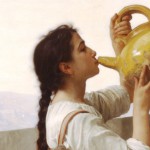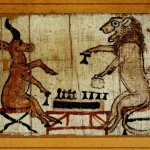AR: What can you tell us about who is engaged in helping to write this encyclical? How does the process of putting together such an encyclical work?
TA: I don’t have detailed information on this. I know that the first draft was written by Cardinal Turkson and his team at the Pontifical Council for Justice and Peace. That was last year. After that, the pope consulted with a number of theological advisers and produced a revised draft. I also believe that some of the scientists affiliated with the Pontifical Academy of Sciences were consulted. One of them, John Schellnhuber – the director of the Potsdam Institute for Climate Impact Research – will actually be at the launch next week, so it seems reasonable that he was brought in as an advisor in the process. That’s certainly a good sign, as Schellnhuber is one of the world’s top climate scientists. Also at the launch will be Metropolitan John (Zizioulas) of Pergamon, representing the Ecumenical Patriarch. This in itself is a remarkable ecumenical gesture. And it has been reported that Metropolitan John was also consulted on the encyclical.
AR: I frequently see the criticism that whenever papal statements go outside of narrowly defined dogmatic matters, then they are vacuous, offer no real guidance, and don’t lead to the development of institutions which do hard work. What can we expect from the “global warming encyclical”? Do you suspect there will be any concrete measures to follow up on it? And is the environment really outside of the realm of dogma given the biblical doctrine of Creation and the mandate for humanity to assume the stewardship of the Earth?
TA: Let be begin by noting that we should not think of this as a “global warming” encyclical. We should instead think of it as an encyclical on “integral ecology.” I believe it will explore, in a deep theological and profound way, our three vital and interconnected relationships – to God, to our fellow human beings, and to all of creation. The clue lies in the title of the encyclical, which comes from St. Francis’s “Canticle of the Creatures” and connotes an attitude of praise, wonder, and gratitude.
As you said, human beings have an obligation to be good stewards of the earth. But when we degrade the natural world, we degrade our fellow human beings – this is integral ecology in action. Yes, climate change is a big part of it, but it’s not the only part – there are also issues like pollution, exploitation of resources, and plummeting biodiversity. I’m sure the pope will call us to conversion, to fix the broken relationships between people and between humanity and the natural world.
So I don’t think this departs from “dogmatic matters” – it is indeed rooted in scripture and in the long tradition of the Church. But the church also reads the sign of the times, including by analyzing the causes and consequences of the problem and suggesting solutions. I think Pope Francis had tipped his hands many times on the roots of the ecological crisis – entrenched consumerism, selfishness and the throwaway culture, a blind adherence to the cult of the market. As for the consequences, the Church will surely appeal to settled science, and the notion of anthropogenic global warming is settled, despite the mountains of misinformation constructed by the deniers. In that sense, the pope must surely follow the advice of Rick Santorum, and leave science to the scientists! Again, it’s interesting that Schellnhuber is helping with the launch of the encyclical.
As for the solutions, it’s hard to know how specific he will get. Will be call people to adopt more sustainable lifestyles? Almost certainly. Will he call for more equitable and inclusive economic systems? Probably. Will he call for a robust climate agreement at the global level? Possibly, as he’s said this before, but we just don’t know at this stage. Will he call for the limitation of global warming to 2 degrees Celsius above pre-industrial levels? Unlikely, as that would step outside the bounds of the encyclical’s competence. But the encyclical will help by providing some much-needed moral seasoning to the process of deliberation. The moral voice will ring loud and clear in Paris, there’s no doubt about that.












